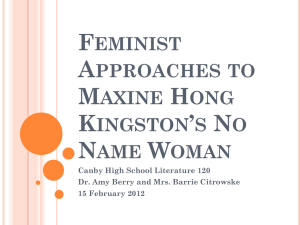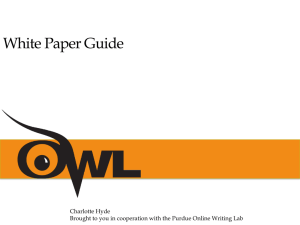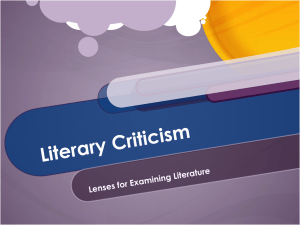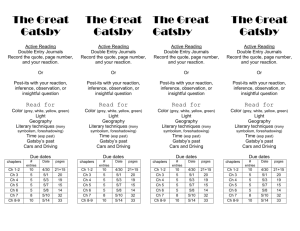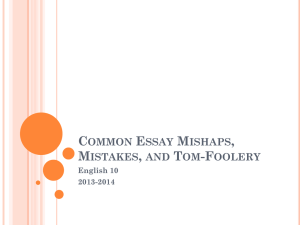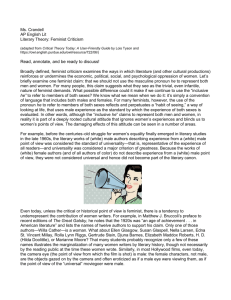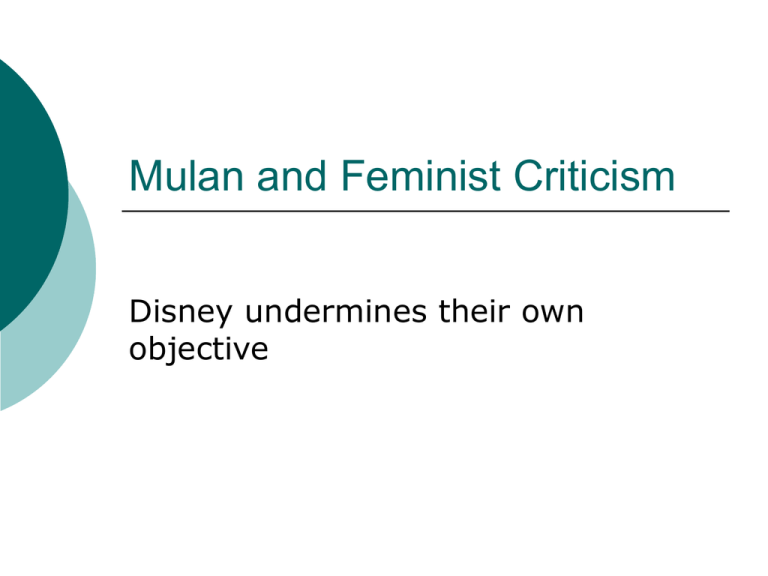
Mulan and Feminist Criticism
Disney undermines their own
objective
What is Feminist Theory?
Feminist criticism is concerned with
"...the ways in which literature (and other
cultural productions) reinforce or
undermine the economic, political, social,
and psychological oppression of women.”
This school of theory looks at how aspects
of our culture are inherently patriarchal
and "...this critique strives to expose the
explicit and implicit misogyny in male
writing about women.”
OWL Purdue
Basic tenants of Feminist Criticism
Women are oppressed by patriarchy
economically, politically, socially, and
psychologically; patriarchal ideology is the
primary means by which they are kept
suppressed
In every domain where patriarchy reigns,
woman is “other”: she is marginalized,
defined only by her difference from male
norms and values
All of western (Anglo-European) civilization
is deeply rooted in patriarchal ideology, for
example, in the biblical portrayal of Eve as
the origin of sin and death in the world
OWL Purdue
Basic tenants of Feminist Criticism
While biology determines our sex (male or
female), culture determines our gender
(masculine or feminine)
All feminist activity, including feminist
theory and literary criticism, has as its
ultimate goal to change the world by
prompting gender equality
Gender issues play a part in every aspect of
human production and experience,
including the production and experience of
literature, whether we are consciously
aware of these issues or not.
OWL Purdue
How do we analyze a text using this
theory?
How is the relationship between men and
women portrayed?
What are the power relationships between
men and women (or characters assuming
male/female roles)?
How are male and female roles defined?
What constitutes masculinity and
femininity?
How do characters embody these traits?
OWL Purdue
How do we analyze a text using this
theory?
Do characters take on traits from opposite
genders? How so? How does this change
others’ reactions to them?
What does the work reveal about the
operations (economically, politically,
socially, or psychologically) of patriarchy?
What does the work say about women's
creativity?
What does the history of the work's
reception by the public and by the critics
tell us about the operation of patriarchy?
OWL Purdue
Mulan: Disclaimer
While the theory is based on the
idea that “All of western (AngloEuropean) civilization is deeply
rooted in patriarchal ideology” and
Mulan is an Eastern story, it is still
told through the eyes of Disney,
which is western.
Mulan through a Feminist Lens
Disney’s overt objective is to undermine
the patriarchal Chinese society they
portray by creating a female character
that breaks all the patriarchal rules.
However, they instead manage to uphold
patriarchal dominance by making her
dependent on a male dragon for success,
need to prove herself to her father, and
the fact that no one wants to
acknowledge her until after she is
successful.
Gender Roles in Mulan
Women
Bear sons
“Fulfill duties calmly
and respectfully”
“Reflect before you
act”
Finding a “good
match”
Perform the tea
ceremony “dignified
and poised”
Make men want to go
to war for you
Men
Serve the emperor
Protect the family
Fight for women
Success or die
Behavioral Expectations
Women
Don’t speak
without permission
Good taste, calm,
obedient
Work quickly
Tiny waist
Don’t contradict a
man
Men
Brave, strength,
tough, fearless,
quick, intelligent,
disciplined,
dedicated,
courageous
obedient to rank
structure
Cunning/strategic
Do characters take on traits from opposite
genders? How does this change others’
reactions to them?
Cross dressing is illegal
Ancestors argue over whether or
not to help her because of what
she’s done
Captain does not let her actions
speak for themselves; he leaves her
behind when he discovers she is a
woman
Soldiers dress as concubines to
save the Emperor
In the end…
Value is based on compliance to societal
norms and expectations, not
accomplishments
They bow to her, but she would not have
been successful without Mushu
She chooses to go home instead of serve
as the Emperor’s Counsul
She bows and presents gifts to her father
to prove her worth
Family only values her after she is
successful
Works Cited
Bancroft, Tony, dir. Mulan. Dir. Barry Cook.
Walt Disney, 1998. Film. 23 Oct 2013.
Purdue OWL. "OWL Purdue Online Writing
Lab."Feminist Criticism (1960s-present).
Purdue University, 04 Oct 2010. Web. 23
Oct 2013.
<https://owl.english.purdue.edu/owl/reso
urce/722/11/>.


